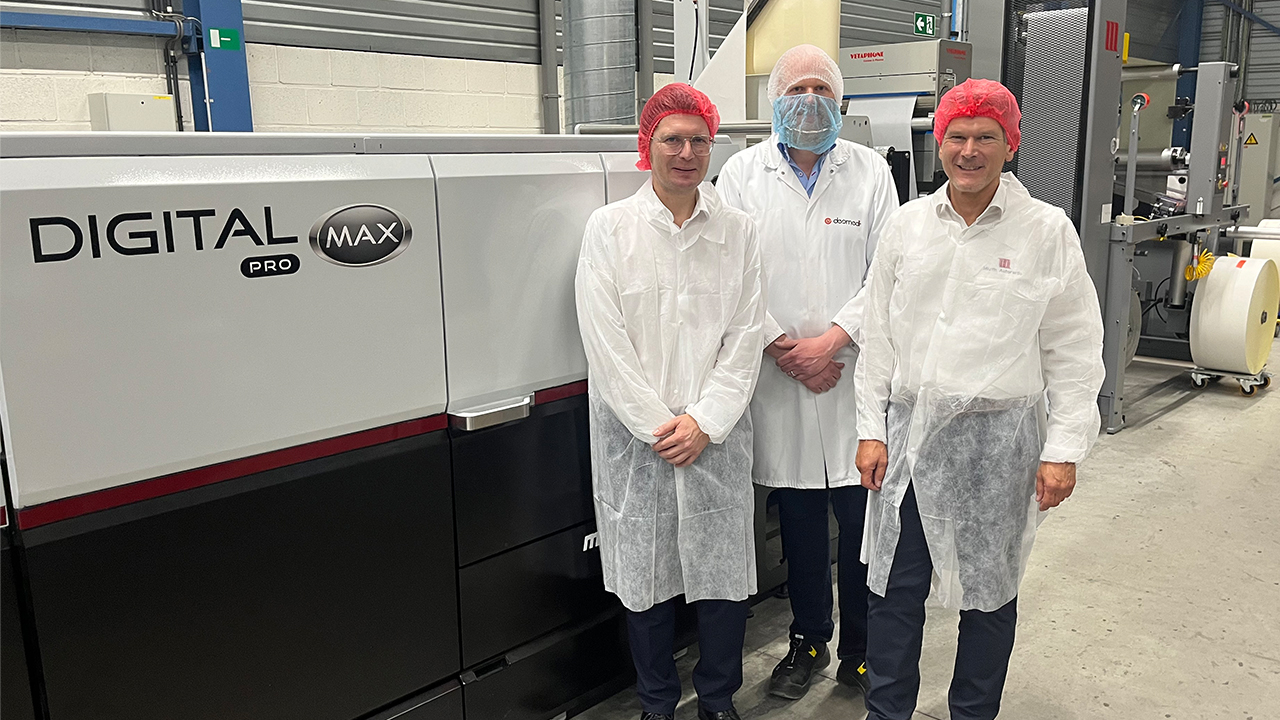Digital pouch startup aims to disrupt Moroccan market
With the founding of EZPac, Moroccan brands can now, for the first time, source digitally printed stand-up pouches locally.
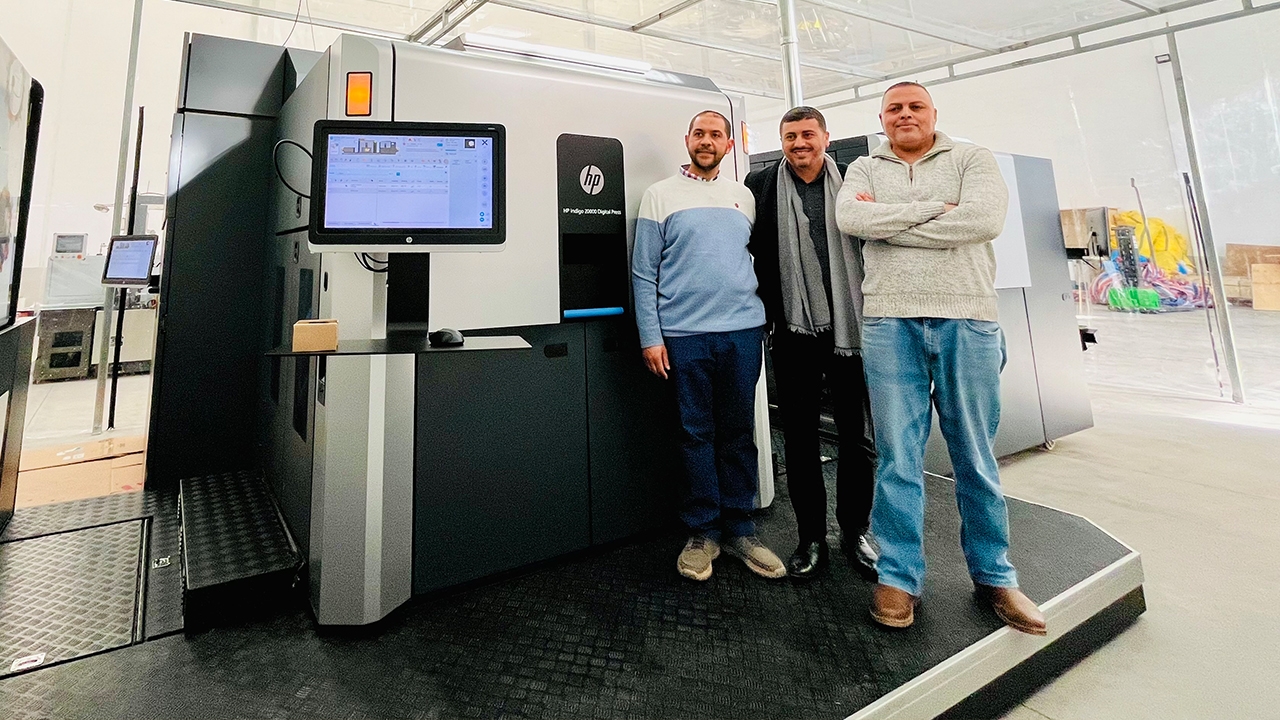
L-R:Yassine Cherkaoui, CEO of EZPac; Reda Moukite, CEO of Redagraph and Mourad Maach, CFO of EZPac with HP Indigo 20000 press
EZPac, a startup digital printing operation, is looking to revolutionize the stand-up pouch market in Morocco following the installation of an HP Indigo 20000 press and pouch manufacturing line.
EZPac was founded by Yassine Cherkaoui with business partner and CFO Mourad Maach in March 2023 after reading about the success of ePac in disrupting the flexible packaging market in other parts of the world.
Behind EZPac lies a long history of print and converting industry expertise. In 1999, Cherkaoui’s father was working for the UN Food Organization in Morocco, where he realized there was a local shortage of large bags to transport goods like flour and sugar. To help fill the gap, Cherkaoui senior founded a new company called Amadic to manufacture woven bags.
Yassine Cherkaoui and his brother later took over this operation and diversified into decorated shopping bags and a joint venture to make 1-2 ton bags for the construction industry.
The industrial market proved disappointing, so the brothers focused on branded shopping bags and related products, such as hard-wearing printed tablecloths for the catering market. The laminated non-woven bags are printed on four 4 to 10 color flexo presses.
‘Three years ago, the idea came to me that flexo was limiting us,’ recalls Cherkaoui. ‘In flexo, you need to print big quantities, and the quality is not quite perfect. You can have problems with ink supplies in the local market where the colors are not exact, and you depend on the local plate suppliers. We found all this hard.’
Flexible packaging
After reading about ePac, Cherkaoui wondered if digital printing of shopping bags might also be possible.
‘I thought this was the solution for my printing problems,’ he says. ‘At the same time, I noticed the first few stand-up pouches on the retail shelves - every month a few more. So, I started thinking about the pouch business and studying how it worked in Morocco.’

Cherkaoui discovered that the bigger brands were buying pre-printed pouches from outside Morocco – from Turkey, for example. Smaller brands, which typically sold their products in the local Souk, were buying plain windowed pouches from China and applying self-adhesive labels by hand, a time-consuming and expensive operation.
Cherkaoui then contacted Reda Moukite at global graphic equipment supplier Redagraph, HP’s agent in Morocco.
Recalls Moukite: ‘As soon as Yassine explained his ideas to me, I told him “I believe in this project, and I will help you make it successful”. I developed a marketing plan and started contacting brands to onboard them on our project. Creative product marketing is vital. This is why we will offer design help and all the tools brands need to create the best custom packaging for their product.’
Machine investment
Cherkaoui and Maach struck an agreement to buy a refurbished HP Indigo 20000 press, which, unlike second-hand or black-market presses, is fully supported by HP.
Cherkaoui also invested in a pouch-making line, along with a laminator and slitting machine. ‘We use hot lamination to make bags in our Amadic factory, but for pouches in the new factory, we use cold lamination. Cold lamination is totally new here and I am learning how to use it.’
Cherkaoui is, without doubt, the most hands-on CEO this writer has come across. He insists on being able to operate every piece of machinery in his factories – including the HP Indigo 20000 press.
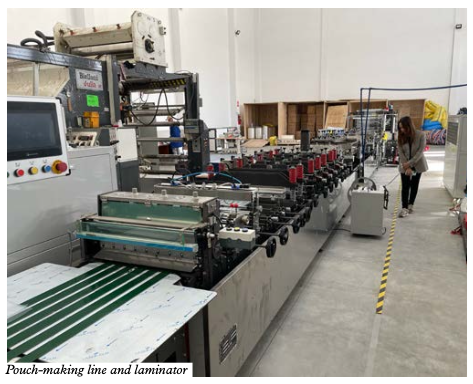
‘Since I was young, I liked to do things with my hands, and I like to find out how things work,’ explains Cherkaoui. ’I learn the machinery myself, and I then teach the operator. This means I understand if something is not being done correctly, and, more importantly, I can understand the limitations and the potential of the machine. For example, the HP 20000 was not designed to handle shopping bags – it has never been used for that before. The press has a 1.12m repeat, but you need a 1.16m repeat for shopping bags. I explained this to the HP engineer, who said it could not be done. But we have worked on this together and now it can.’
Training on the HP Indigo 20000 press did present some obstacles. ‘We have challenges in Morocco getting visas to visit HP’s demo center in Barcelona. It can take six to seven months just to get a visa appointment. So, HP sent an engineer here to train me and I also train remotely online.’
Products
When L&L visited EZPac, Cherkaoui was digitally printing film for lamination to a non-woven shopping bag. ‘This will open up whole new markets for our customers in premium, short-run bags, which they can order in small lots for special occasions such as Ramadan and sporting events like the Africa Cup,’ says Cherkaoui. ‘The brand owners simply upload their files to us, and our team optimizes the designs for the 20000 press before sending them back to the customer for approval. Short runs, VDP, personalization – this is something you simply cannot do in flexo. We think the big brands will love that.’
While there are existing (and enthusiastic) customers for digitally printed shopping bags, selling printed pouches will present more of a challenge.
Cherkaoui sees three categories of potential buyers.
He says: ‘Firstly, there are brands that already source pouches from outside Morocco. This is quite an easy sell, and we are currently working on our first project.’
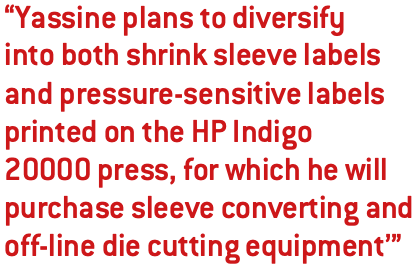
Secondly are the brands which do not currently use pouches, but usually use printed bags. ‘We have to persuade them to invest in packaging machinery, which is not easy. We have to make some development with them.’
Lastly, smaller brands are looking to replace hand-labeled plain pouches. This could be an exciting area for startups looking to differentiate their products.
As a next step, Cherkaoui plans to diversify into both shrink sleeve labels and pressure-sensitive labels printed on the HP Indigo 20000 press, for which he will purchase sleeve converting and off-line die-cutting equipment.
Growth potential
Moukite is enthusiastic about EZPac’s vision and future: ‘Why would brands import when the technology is available here?’
It certainly seems to be the right time to shift the market to domestic pouch production. ‘The consumer market is booming here, creating a huge demand for packaging. The population is growing, and Moroccans are very demanding in terms of packaging customization. People can see cool products being made in Korea and Japan on social media and say why can’t we have that? Especially young people using social media want the smartest products.’
Moukite says that post-Covid the mindset of brand owners has changed, with marketing departments now involved more and more in packaging development, whereas before, it was just procurement. ‘That is why we need to be more creative – to allow these people to differentiate their products. We have many small new brands which also want to export. This means they are more concerned about having the right colors in the packaging to be able to find their consumers on supermarket shelves. Making the local brands source locally in Morocco will help them to expand.’
All this comes on the back of a significant growth in domestic manufacturing of goods of all kinds and a push to export. ‘Now there are many more choices of FMCG products,’ says Moukite. ‘When I was young, we used to go outside Morocco to buy chocolates. Morocco has become one of the major agri-food exporters, exceeding 7 billion USD in annual revenue. Packaging has been sourced outside Morocco because people did not find the technology here that can print with the quality common in Europe. That’s why buyers go to Turkey, Tunisia or Dubai. We want to bring back these accounts and start producing locally.’
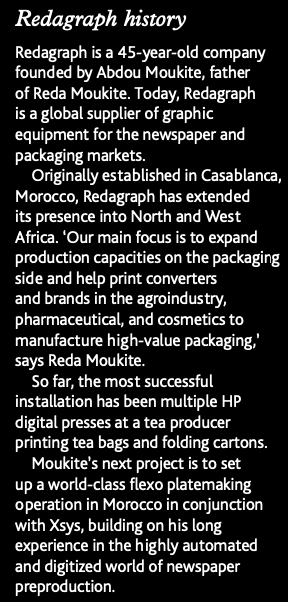
One major hurdle is the conservatism of the wider package print industry. ‘Converters offer only what they are able to print, so the change will come from brand owners as they need more and more versatility and flexibility,’ says Moukite. ‘Christian Menegon, my old friend at HP Indigo, used to tell me that you have to think about the customer of your customer, and this is how they need to think. So, the question is, how can we get our printers to invest in the equipment that will transform our packaging industry?’
Many developing countries are in the same position as Morocco, with a growing and increasingly demanding consumer class but an outdated printing base that cannot keep up with the latest packaging formats and quality expectations.
‘It does take people who are slightly crazy to make this happen – people like my friend Yassine and myself! We are the right people and at the right time.’
Stay up to date
Subscribe to the free Label News newsletter and receive the latest content every week. We'll never share your email address.

